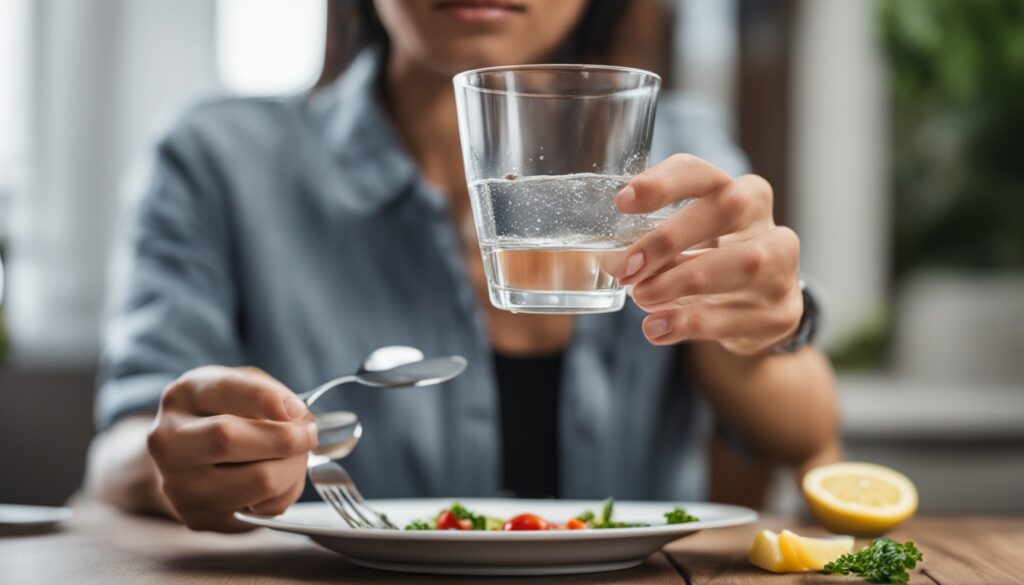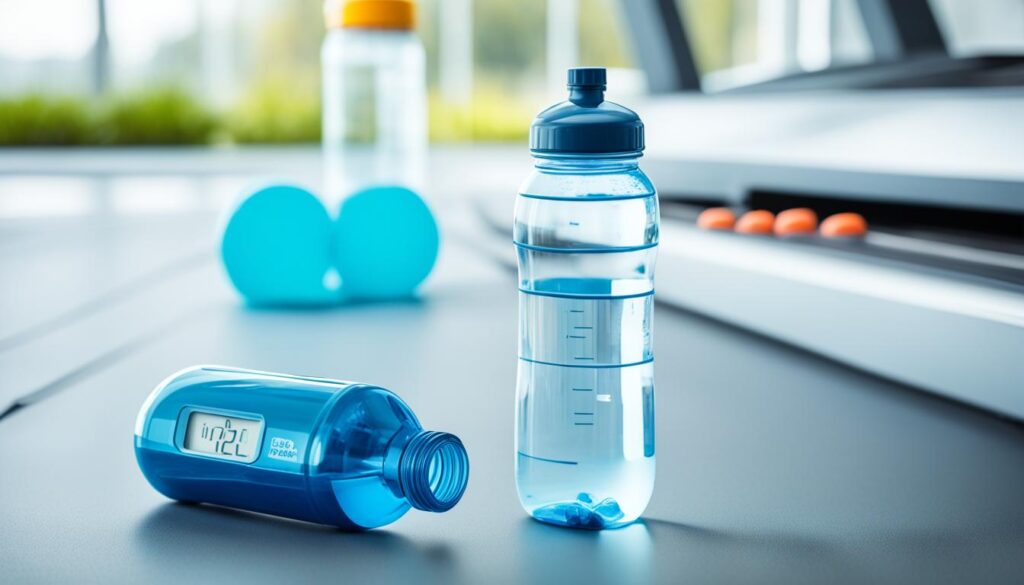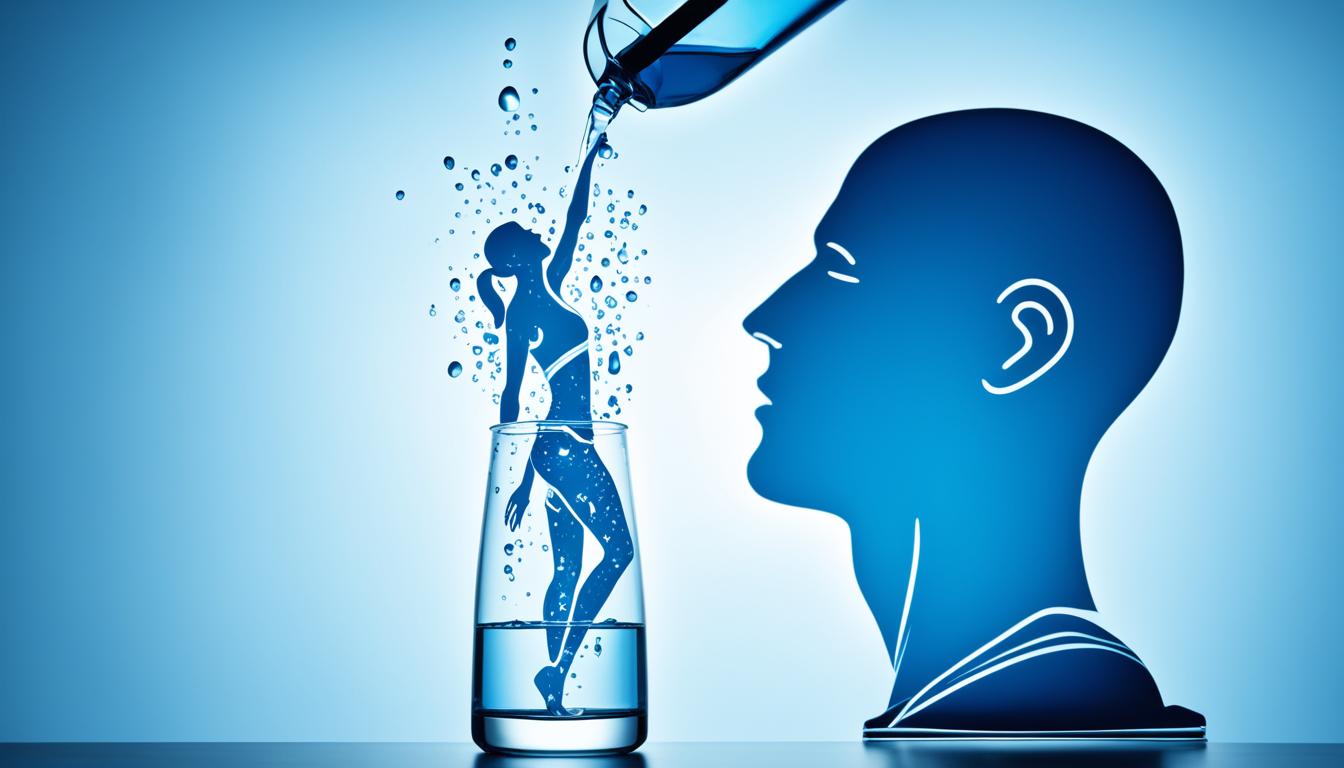Drinking water is key for many body functions. This includes digestion and muscle work. On average, females should aim for 9 cups a day, with males needing about 13 cups1. Water makes up 60% of your body, so keeping hydrated is vital for a healthy metabolism1.
More water can help you lose weight. It can bring down your body fat and BMI. In an eight-week study, overweight participants who added 1500 ml of water to their daily intake saw positive changes. They went from 65.86 kg to 64.42 kg in body weight, with their BMI dropping from 26.7002 to 26.1224. Their body composition scores also improved from 79.626 mm to 76.578 mm2. These findings were verified to be significant through careful statistical analysis with SPSS and paired t-test2.
Water is important for breaking down fat (lipolysis). A review of animal studies in 2016 showed that more water led to more fat burned. This suggests that by drinking enough water, you might help your body burn more fat naturally1. So, keep hydrated. It can assist your body in maintaining a healthy metabolism.
Hydration and Weight Loss: The Surprising Connection
The link between being well-hydrated and losing weight is fascinating. Not only is water crucial for health, but it also helps in dropping off those extra pounds. Since most of our body is water3, keeping up with water is key for top performance. So, how does it help in losing weight?
Water’s Role in Regulating Appetite and Hunger
Water is great for controlling your weight by managing hunger. Our stomach signals our brain to stop eating when it feels full. By drinking water before meals, you can fill up your stomach somewhat. This helps you feel full and eat less overall4. A study with 50 overweight women showed that drinking 500 mL of water before meals reduced their weight, body fat, and BMI. It also made them less hungry3.
People sometimes think they are hungry when they’re really just thirsty. This can lead to unnecessary snacking. Drink enough water during the day to avoid this mistake4. Having water before a snack can cut down on that snack. It stops you from eating when you’re not truly hungry4.
Replacing High-Calorie Beverages with Water for Weight Loss
Choosing water over high-calorie drinks is another weight loss trick. Drinks like soda and juice fill you with calories but not nutrition. Water, on the other hand, is zero calories. Swapping them saves you lots of calories, helping you lose weight over time.
Studies show that more water means fewer calories eaten. Swapping just one “bad” drink for water daily can save you 200 calories. That’s almost 6 pounds of fat less on you in a year!
| Beverage | Calories per 20 oz | Calories saved by switching to water (per day) | Potential weight loss (per year) |
|---|---|---|---|
| Soda | 240 | 240 | 7 lbs |
| Sweetened iced tea | 200 | 200 | 6 lbs |
| Fruit juice | 250 | 250 | 7.5 lbs |
| Sports drink | 130 | 130 | 4 lbs |
Swapping drinks for water not only cuts calories but also helps with food choices. When you’re well-hydrated, you feel more alert and focused. This sharpness can steer you towards better food decisions.
Knowing how important water is for weight loss is powerful. Drink before meals, keep hydrated, and choose water over sweet drinks. These steps will help in the long run. So, grab that glass of water next time. Your body will thank you with better metabolism and weight loss!34
Water-Induced Thermogenesis: Boosting Metabolism Naturally
Drinking plenty of water not only fights off thirst but also speeds up how your body uses energy. Research shows that water can make your body use more calories, even when you’re not moving. So, by drinking water, you might burn more fat and calories5.
Understanding the Thermogenic Effect of Water
In a study, 50 young women who were a bit overweight saw great results by drinking more water. They added 1500 ml of water to their daily intake and lost weight over eight weeks. The ones who drank more water saw improvements in their weight, body mass index (BMI), and body fat scores all significantly2.
How does this happen? The body needs to warm up the water to body temperature after you drink it. This process burns extra calories. That’s why earlier research found that drinking water increases how fast we burn calories, by almost a third, in men and women2.
Drinking Cold Water for Enhanced Calorie Burning
Drinking cold water could boost this fat-melting effect even more. A study showed that drinking 500 ml of cold water could help burn a few more calories. Over the next 90 minutes after drinking, the body uses more energy to warm up the cold water to body temperature5. This leads to increased fat burn and possibly weight loss.
Experts aren’t entirely sure how drinking water helps burn more calories. But they think it might be because of how water affects our cells, helping our bodies break down fat better. A study in 2016 found that drinking 500 ml of water can increase how much fat our bodies use when we’re not active5.
It’s clear that staying hydrated boosts our metabolism and might help with losing weight. Making sure you drink enough water each day is an easy way to do this. Try to drink water often and, if you can, choose cold water. It might help your body burn calories naturally and more efficiently.
The Science Behind Water and Metabolism: Boost Your Metabolism Naturally
Water is key in how your body burns fat and uses energy. It helps break down fat and carbs. The first step in breaking down fat is when water acts on fat stores, turning them into smaller parts the body can use. If you don’t drink enough water, your body struggles to use stored fat and carbs to make energy. This can slow your weight loss and make your metabolism work less effectively.
A little extra water can make a big difference in how you lose weight and keep your metabolism running well. An early 2003 study found that drinking two cups of cool water raised the metabolism of healthy people by 30%. And drinking just over a cup of water can help your body burn more fat when you’re resting, suggesting water can help boost your metabolism5.
Drinking enough water is also important for controlling your appetite. A small 2016 study showed that those who drank water before a meal ate less. And swapping water for sugary drinks can help overweight women lose more pounds, according to a 2015 study1.
“In an eight-week study, 50 girls with excess weight who drank about two cups of water half an hour before meals lost weight and saw reductions in body mass index and body composition scores1.”
Don’t forget, lack of water might increase the stress hormone cortisol, says a study1. Too much cortisol can make you eat more and gain weight. But we need more studies to know exactly how stress affects our metabolism5.
Here are ways to naturally fire-up your metabolism and lose weight:
- Always drink plenty of water, aiming for at least 8 glasses or 2 liters daily
- Swap sugary drinks for water to cut down on calories
- Drink a glass of water before meals to curb overeating
- Keep hydrated when working out to burn more fat and boost performance
With these strategies and a bit of science insight, you’re all set to rev up your metabolism. By focusing on water and your daily routine, you’ll be on your way to meeting your weight loss targets.
Drinking Water Before Meals: A Simple Weight Loss Strategy
Drinking water before meals can boost your weight loss journey. It helps you eat less by making you feel full quicker. A 2016 study showed those who drank water before eating ate 22% less1.

Studies Reveal the Benefits of Pre-Meal Water Consumption
Research has found a link between drinking water before meals and weight loss. A study with overweight women found that drinking 500 mL of water 30 minutes before a meal helped reduce weight, body fat, and BMI. Plus, it made them feel less hungry6. This approach might not work alone but can aid your weight loss by cutting calories over time.
Optimal Timing and Amount of Water for Weight Loss
When drinking water before a meal, the timing and amount are key. Drink water 30 minutes before eating. This gives it time to fill your stomach and makes you less likely to overeat. The Academy of Nutrition and Dietetics recommends a daily goal of about 11.5 cups for women and 15.5 cups for men, including both water and other drinks, with most coming from beverages6.
| Gender | Recommended Daily Water Intake | Water Intake from Beverages |
|---|---|---|
| Females | 11.5 cups (2.7 liters) | 9 cups (2.1 liters) |
| Males | 15.5 cups (3.7 liters) | 13 cups (3.1 liters) |
Drinking water throughout the day is also vital. It keeps your body running well and helps with focus and brain function. Being dehydrated can slow you down in many ways. So, adding more water to your day, especially before meals, can aid in losing weight naturally.
Water and Exercise: Enhancing Fat Burning and Performance
Exercise is key to losing weight, and being hydrated is vital for best outcomes. Our bodies are mostly made of water, about 60%3. Athletes can sweat out 6-10% of their water weight during hard workouts3. So, it’s important to drink enough water to stay hydrated, aiding in weight loss along the way.
Staying Hydrated During Workouts for Optimal Results
Not drinking enough water can cause muscle cramps, tiredness, and a drop in performance. This slows down your fat burning and fitness progress. Even losing just 1-3% of your fluids can lower your energy, mood, and brain power3. So, remember to drink water not just during but also before and after exercising, especially in hot weather.
Here are some tips to stay well-hydrated during your workouts:
- Drink 17–20 ounces of water 2–3 hours before exercising
- Consume 8 ounces of water 20–30 minutes before starting your workout
- Drink 7–10 ounces of water every 10–20 minutes during exercise
- Replenish fluids with 8 ounces of water within 30 minutes of completing your workout
Water’s Role in Muscle Function and Recovery
Water is essential for healthy muscles and quick recovery. It helps joints and organs work well, including the heart and lungs. As essential, it helps balance electrolytes and spread them through the body, which is key for our muscles to move.
After working out, water’s still super important. It helps clear out waste and sends needed nutrients to the muscles. A lack of water can slow down your fat burning, as shown in a 2016 study1. This is why keeping hydrated is crucial for bouncing back after exercise and keeping up the good work in burning fat.
| Hydration Level | Effects on Exercise Performance |
|---|---|
| Well-hydrated | Optimal performance, efficient fat burning, and muscle function |
| Mild dehydration (1-3% fluid loss) | Impaired energy levels, mood, memory, and brain performance |
| Moderate dehydration (3-6% fluid loss) | Decreased endurance, increased fatigue, and reduced motivation |
| Severe dehydration (>6% fluid loss) | Increased risk of heat illness, heat stroke, and other severe complications |
Focus on drinking enough water during your workouts to boost fat burning, make your exercises better, and help in your weight loss journey. Always keep an eye on how your body feels and drink water regularly to keep going strong and recovering well.
Dehydration and Metabolism: How Inadequate Water Intake Hinders Weight Loss
Not drinking enough water can really slow down your body’s fat burning. Without proper hydration, it’s harder for your body to get rid of waste. This leads to bloating, swelling, and feeling tired. Those feelings can stop you from working out and eating right1.
Just being a little dehydrated, like losing 2% of your body’s water, can mess with your thinking and moving. It can also mess with your memory and stop you from burning fat like you should. Some researchers even think dehydration might make you more likely to get overweight or have diabetes7.

A 2009 study pointed out that not drinking enough water is bad for your heart, makes you more likely to be fat, and even to get cancer7. If you’re dehydrated, your body makes more of the stress hormone cortisol. More cortisol might make you feel less like working out or handling stress1.
Drinking enough water is key for your metabolism and for losing weight. Water helps your body use stored fat and sugar right. Since most of you is water, staying hydrated helps with everything your body does1.
“Inadequate water intake can significantly hinder weight loss efforts by impairing the body’s ability to burn fat and remove waste products efficiently.”
To make your metabolism work better and help with losing weight, try these:
- Drink lots of water all day, aiming for at least 8 cups (64 ounces) daily.
- Swap soda and other sweet drinks for water to cut down on how many calories you take in.
- Drinking water before meals can make you feel fuller and help you eat less.
- Keep drinking water when you’re working out to do better and burn more fat.
Focus on staying hydrated to keep your metabolism sharp. It’ll help combat dehydration’s negative effects on losing weight. Plus, it’s just good for your health in general.
Water’s Impact on Digestion and Waste Removal
Water is key for good digestion and removing waste from our bodies. It stops things like constipation and bloating by keeping things moving. Water also helps our detox process and keeps our kidneys working well8.
Preventing Constipation and Bloating with Adequate Hydration
If we don’t drink enough, we get backed up and bloated. Even just a little bit of dehydration can make us tired and put us at risk for infections and kidney stones8. Drinking plenty of water keeps our stool soft and lets us go easily, cutting down on tummy troubles8.
Water’s Role in Detoxification and Kidney Function
Water doesn’t just help our digestion, it plays a huge part in cleaning out our body too. Our kidneys need water to get rid of toxins while keeping good stuff we need. This helps our body detox and stay healthy8.
The National Academy of Medicine says men should drink about 13 cups daily, and women should aim for 98. But your water needs could change based on your life, like how active you are or where you live6. Eating fruits and veggies containing lots of water also helps, like berries and melons6.
| Age Group | Daily Water Intake Recommendation |
|---|---|
| Children 1-3 years | 4 cups |
| Children 4-8 years | 5 cups |
| Girls 9-13 years | 7 cups |
| Boys 9-13 years | 8 cups |
| Girls 14-18 years | 8 cups |
| Boys 14-18 years | 11 cups |
| Women 19+ years | 9 cups |
| Men 19+ years | 13 cups |
| Pregnant women | 10 cups |
| Breastfeeding women | 13 cups |
Drinking enough water is great for digestion and detox. It helps keep you healthy and feeling good8. If pure water doesn’t appeal to you, try putting in things like citrus fruits or berries for a tasty twist8.
The Link Between Water, Stress, and Metabolism
Drinking enough water is vital for staying healthy and reducing stress. The human body is largely made up of water, around 60%. This means drinking water is key for many of our body’s functions1. Without enough water, our efforts to lose weight might stall, and our stress levels could go up.
Not getting the right amount of water can lead to feeling tired, dizzy, and confused. This makes it hard to stay motivated and choose healthy foods. Also, not drinking enough water can make our body produce more cortisol, the main stress hormone1. An International Journal of Sports Medicine study showed that not being hydrated increases cortisol. This can hurt how well we manage our weight and metabolism1.
Dehydration’s Effect on Cortisol Levels and Stress
If your body doesn’t have enough water, cortisol levels can rise. This can make it tough to lose weight. High cortisol makes you want to eat more, especially unhealthy foods. It also leads to storing fat, especially around the stomach. Drinking enough water can help keep cortisol in check, lessening stress and supporting good metabolism. This, in turn, helps in managing your weight better.
FAQ
How much water should I drink daily to support weight loss and boost metabolism?
Can drinking water before meals help with weight loss?
Does drinking cold water boost metabolism more than room temperature water?
How does dehydration affect weight loss efforts and metabolism?
Can replacing high-calorie beverages with water aid in weight loss?
How does water intake support exercise performance and fat burning?
Source Links
- https://hub.jhu.edu/at-work/2020/01/15/focus-on-wellness-drinking-more-water/
- https://www.ncbi.nlm.nih.gov/pmc/articles/PMC3809630/
- https://www.healthline.com/nutrition/7-health-benefits-of-water
- https://naturallyyours.in/blogs/blog/the-surprising-connection-between-drinking-water-and-weight-loss
- https://www.medicalnewstoday.com/articles/323328
- https://www.medicalnewstoday.com/articles/322296
- https://www.ncbi.nlm.nih.gov/pmc/articles/PMC4901052/
- https://nutritionsource.hsph.harvard.edu/water/




